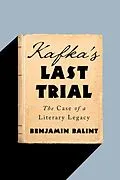Winner of the 2020 Sami Rohr Prize for Jewish Literature
"Dramatic and illuminating...[R]aises momentous questions about nationality, religion, literature, and even the Holocaust." ?Adam Kirsch, The Atlantic
When Franz Kafka died in 1924, his loyal friend Max Brod could not bring himself to fulfill Kafka's last instruction: to burn his remaining manuscripts. Instead, Brod devoted his life to championing Kafka's work, rescuing his legacy from both obscurity and physical destruction. Nearly a century later, an international legal battle erupted to determine which country could claim ownership: the Jewish state, where Kafka dreamed of living, or Germany, where Kafka's three sisters perished in the Holocaust? Benjamin Balint offers a gripping account of the controversial trial in Israeli courts?brimming with dilemmas legal, ethical, and political?that determined the fate of Kafka's manuscripts.
Autorentext
Benjamin Balint is a research fellow at the Van Leer Institute in Jerusalem. The author of Running Commentary and coauthor of Jerusalem: City of the Book, he writes for The Wall Street Journal, Die Zeit, and the Claremont Review of Books, and his translations from the Hebrew have appeared in The New Yorker.
Klappentext
Winner of the 2020 Sami Rohr Prize for Jewish Literature "Dramatic and illuminating...[R]aises momentous questions about nationality, religion, literature, and even the Holocaust." —Adam Kirsch, The Atlantic
When Franz Kafka died in 1924, his loyal friend Max Brod could not bring himself to fulfill Kafka's last instruction: to burn his remaining manuscripts. Instead, Brod devoted his life to championing Kafka's work, rescuing his legacy from both obscurity and physical destruction. Nearly a century later, an international legal battle erupted to determine which country could claim ownership: the Jewish state, where Kafka dreamed of living, or Germany, where Kafka's three sisters perished in the Holocaust? Benjamin Balint offers a gripping account of the controversial trial in Israeli courts—brimming with dilemmas legal, ethical, and political—that determined the fate of Kafka's manuscripts.
